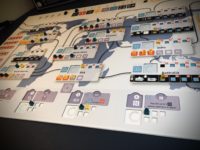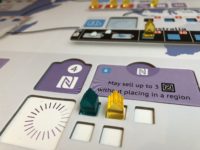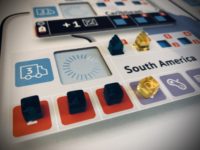- Learning time
- 60 minutes
- First play time
- 150 minutes
Smartphone Inc
Designed by: Ivan Lashin
In Smartphone Inc, as entrepreneurial phone-sellers your goal is to make the most cash. How? By entrepreneurially selling phones, across the globe: on the cheap, on the less-cheap, and somewhat on the fly: although the gist here is make phones > sell phones, there is a lot of tactical nuances in how this wheeler-dealing plays out…
The large board shows a map of the world broken up into markets. You can only sell into a market if you have an office there, but everyone starts with one office in a market that – currently – only they are present in. Everyone also has two pads and a confection of bits: cubes represent a container of phones (to be sold) progress markers represent progress: building an office, or developing a patent (more on both shortly), and the offices themselves that are necessary for retail.
Let’s return to the pads. Smartphone plays out over five rounds, and in each round there are a number of phases. The first one – planning – is critical to how productive the others will be. On each side of each pad are six cells, and the cells determine both what actions are available to you, and how powerful they’ll be. Imagine them as orders from your company’s head office down the chain of organisation: everyone secretly combines the pads by overlapping them – at least one cell must be obscured – and then everyone reveals at the same time.
Having made your plans, you now activate them. In phase 2 your cells may (or may not) have affected the price you’re selling your phones at, so the prices for everyone are adjusted accordingly. Phase three is Production: you get a container for both every container cell visible on your pads and every cell you’ve covered up. Phase four is Improve Production – players take improvement tiles that will either improve their pad options in a subsequent round, or their phone production. Phase five is Research Technology: selling phones with wifi or bluetooth, for instance, means you can sell more phones. And though being first to develop a technology is a little more expensive on your progress markers, it does reward you with additional cash. Each technology also gives you a little benefit for the rest of the game as well – establishing new offices, for instance, or boosting your logistics, which is phase six…
Logistics sees you developing new offices in adjacent regions to your own, adding progress markers until you’ve hit the target number needed to turn them into an office instead. Which helps you with phases seven and eight – where the action is. Selling Goods (phase seven) to markets where you have offices is critical, and we should pause here to establish loud and clear that turn order is equally critical: whoever has priced their phones the lowest goes first, which means they can fill up the cheaper end of the markets before higher-priced tech gets there. Although the higher-priced phones wouldn’t be bought by the same clientele, this can be really key to bagging high returns (phase eight: Receive points) because everyone scores the amount of their own cubes on the board multiplied by the price they’re selling at. A higher price means that multiplication is bigger – but, you need to be sure you’re got enough cubes on the board to make it worth your while, and if almost every spot is filled already, the elite pricing strategy could blow up in your face.
Which brings us back to the planning phase for the next round, and the realisation that the cells you leave visible (and the amount you cover, which help with production if you recall!) have so much impact on how each round will play out. Price low for potential turn order advantage. Price high for potential higher returns. Focus on tech development to sell to customers who want that specific kit. And bear in mind the improvement tiles, which turn your basic starting pads into pimped-up corporate production machines. After the fifth round is over, there is a final scoring, with the richest player declared winner.
With less than five players some markets only offer a points reward for building offices – phones may not be sold there. With one player, the game offers an ‘AI’ opponent with simple rules, called ‘Steve’.
The guru's verdict
-
Take That!
Take That!
There's no direct interaction but you can certainly have plans harpooned by what the other players get up to - turn order is pivotal and although going later can be rewarding, it's at a risk.
-
Fidget Factor!
Fidget Factor!
Everyone makes their plans at the same time, then you may have a wait while players before you in turn order activate each phase - although some a very quick indeed. But what plays out on the board impacts on you, so it's likely you'll be keenly watching how things progress.
-
Brain Burn!
Brain Burn!
Although the eight phases sound like a huge amount to think about at first glance, Smartphone actually rumbles along reasonably quickly once you get through the first exploratory play. But the planning phase is really what defines progress, or lack thereof, and this does come with a cognitive cost.
-
Again Again!
Again Again!
If you enjoy the thinky experience Smartphone offers, then even the basic pads offer huge variety in how the game plays out. Factor in the improvement tiles and tactical decisions on the board, what tech to develop in tandem with your sales strategy - and there's a sense you could play the game a hundred times and still not know how it would pan out. Key to this is you don't know what your opponents are planning until it's too late to adapt!














Sam says
I confess the idea of selling phones isn't something I yearned to experience for myself in a game environment. But it's surprising how a seemingly-banal theme comes to life, and that's largely because of the planning aspect of Smartphone. I'm no expert, but I don't think this is how it happens in real life... but it does conceptually represent the allocation of resources in a forgivable way and really give you a head-scratcher in terms of what to do. Push early for technologies, grab patents and sell to the bespoke-demanding crowd? Sell low and try and spread across the board early? Sell as high as you can for as long as you can? The if/but/then/aha, but then of it all reminds me of puzzly games such as Trajan, and while the puzzle itself doesn't feel thematic, what it implements on the board certainly does. Like a modern-day Monopoly, Smartphone Inc plays like both a celebration of and a warning against capitalism: competition might be healthy, but there's only one winner. There's no acknowledgement of where resources come from; the environmental or human cost. Outside of all that, my blunt summary of Smartphone is that it's just not as fun as a game should be - the satisfaction quotient may be high when your plans come together, but do we play games for satisfaction? I'm giving this a Good rating for cleverness, a bit of bluff and some tense interaction on the board, where market shares are effectively a series of races. But it's very mechanical, and I almost felt like a robot playing it.